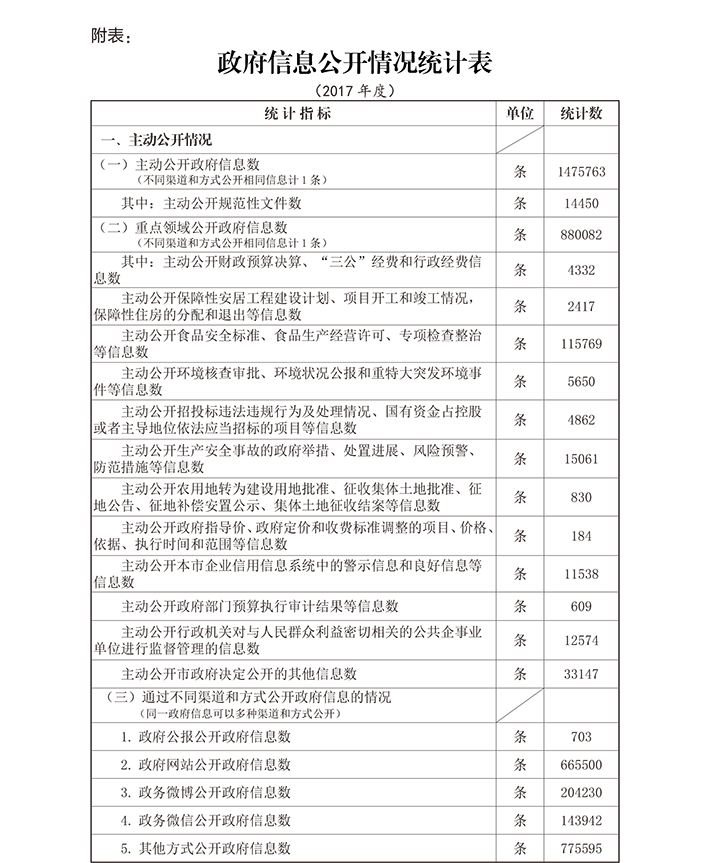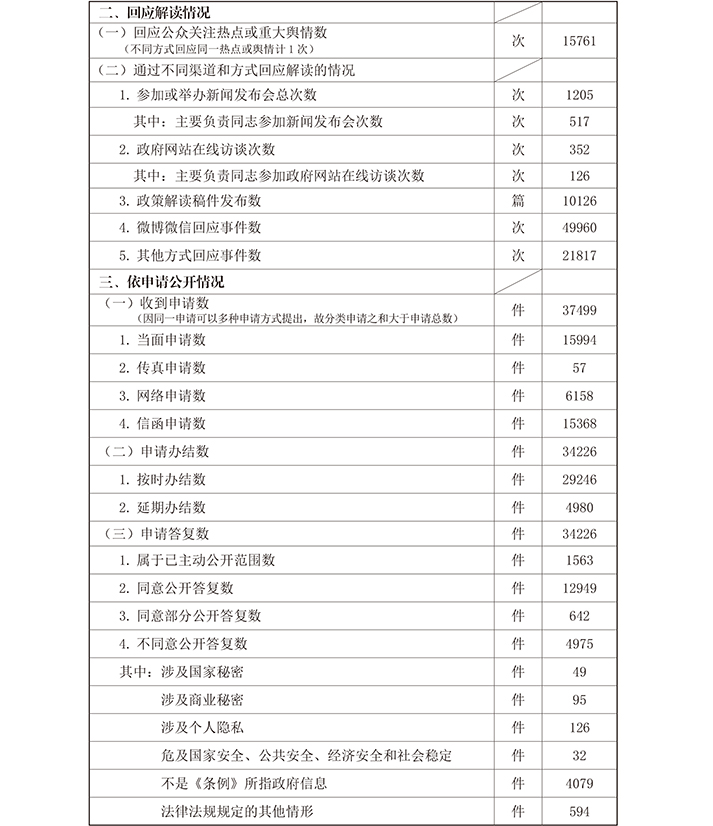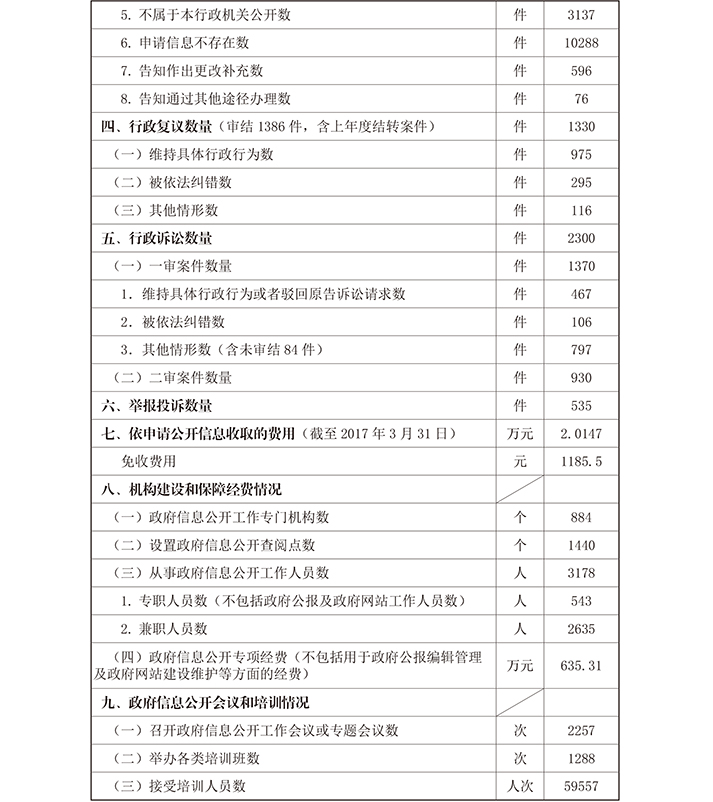2017 Beijing Municipal Government Information Disclosure Annual Report
3 according to the application of public government information charges.
In accordance with the requirements of the Notice of the Municipal Finance Bureau and the Municipal Development and Reform Commission on Cleaning up and Regulating a Batch of Relevant Policies for Administrative Charges (J.C.Z. [2017] No.569), since April 1, 2017, this Municipality has stopped charging fees for disclosing government information upon application. As of March 31, 2017, all administrative organs in the city charged 20,147.6 yuan for searching, copying, mailing and other fees for providing government information upon application in accordance with the Measures of Beijing Municipality on Charges for Providing Government Information upon Application. For rural five-guarantee recipients, urban and rural residents’ minimum living guarantee recipients, and special care recipients who receive state pension subsidies, the relevant expenses are exempted in accordance with the law, totaling 1,185.5 yuan.
(four) administrative reconsideration, administrative litigation and reporting.
1. Administrative reconsideration
The city’s administrative organs accepted 1330 cases of administrative reconsideration of government information disclosure, including 376 cases accepted by the municipal government, 515 cases accepted by 16 district governments and 439 cases accepted by government departments with administrative reconsideration functions. A total of 1,386 cases of administrative reconsideration of government information disclosure were concluded in the whole year (including cases carried over from the previous year), of which 975 were informed of the government information disclosure reply made by the administrative organ, 249 were revoked, 27 were confirmed to be illegal, 19 were ordered to perform their statutory duties within a time limit, 35 were rejected by the applicant, 80 were voluntarily withdrawn by the applicant, and the case was closed by other means.
2. Administrative litigation
The city’s courts have tried 2300 administrative litigation cases related to government information disclosure. Accepted 1370 cases of first instance. Among them, 467 claims were rejected, 61 administrative actions were revoked, 25 administrative organs were judged to perform their statutory duties, 20 cases were judged to be illegal, 524 cases were dismissed, 32 cases were rejected, 131 cases were dismissed, 26 cases were transferred to other courts, and 84 cases were not concluded. 930 cases of second instance were accepted. Among them, 390 judgments were upheld, 3 judgments were revoked, 457 rulings were rejected, 2 rulings were sent back for retrial, 21 rulings were withdrawn, and 57 cases were not concluded.
Step 3 report
The city’s administrative organs received 535 reports related to the disclosure of government information. The Office of Information and Government Affairs Openness of the Municipal Government received 44 reports related to the disclosure of government information, and suggested that informants report 10 cases to relevant authorities in accordance with relevant procedures, and handled 34 cases (after investigation, 7 cases were true and 27 cases were inaccurate).
(5) Institution building and security training.
There are 884 specialized agencies for government information disclosure in this city, and 1440 government information disclosure access points have been set up. There are 3,178 staff engaged in government information disclosure, including 543 full-time staff and 2,635 part-time staff. The special fund for government information disclosure is 6,353,100 yuan. In the whole year, the city held 2257 meetings or special conferences on government information disclosure, held 1288 training courses of various types, and received 59557 trainees.
Fourth, the existing shortcomings and key work in 2018
(A) the existing deficiencies
First, the development of government information and government affairs disclosure is uneven, so it is necessary to adapt to the new era and new requirements, achieve a refined, personalized and characteristic publicity effect, and strive to upgrade from "standard specification" to "precise service". Second, the research on the people’s "information demand side" is not deep, the public information is not practical enough, and there is a gap in serving people’s lives and facilitating people’s work. The pertinence, quality and effect of policy interpretation need to be strengthened. Third, there are too many open platforms, which are inconvenient to find and retrieve, insufficient analysis of people’s habits and ways to obtain information, weak pertinence and differentiation of open channels, low arrival rate of new media and poor coverage.
(II) Key tasks in 2018
First, continue to promote information disclosure in key areas. We will fully implement the "Opinions on Comprehensively Promoting the Openness of Government Affairs" and the relevant requirements of the detailed rules for implementation, conscientiously implement the series of decision-making arrangements made by the CPC Central Committee and the State Council on promoting the openness of government information in key areas, and continue to do a good job in the information disclosure of financial budgets and final accounts, the allocation of public resources, the approval and implementation of major construction projects, and the construction of social welfare undertakings.
The second is to improve the interpretation level of government work. Further innovative interpretation of communication forms, comprehensive use of digital, graphic, animation video and other vivid ways to enhance affinity, guidance, communication and influence.
The third is to do a good job in the pilot project of standardization of grassroots government affairs openness in China. We will promote mechanism innovation in decision-making, policy interpretation, public participation, and public release of official documents in the five pilot areas, strengthen the standardization of government affairs openness, and promote the "streamline administration, delegate power, strengthen regulation and improve services" reform and "internet plus government affairs" in coordination, carry out the collection and selection of typical practices of grassroots government affairs openness to serve the masses, and build a demonstration benchmark for grassroots government affairs openness.
The fourth is to continue to promote public participation. We will establish a long-term mechanism for the dynamic management of government affairs, benefit the people and facilitate the map, enrich the map content according to the people’s experience and feedback, and build it into an information service platform with high public utilization rate and high satisfaction. Promote the normalization of government affairs open days, expand the scope, frequency and depth, and extend to districts, streets (towns) and communities (villages).
The fifth is to promote the intensive innovation and development of government websites. Further standardize the construction and development of the city’s government websites, complete the standardization and integration of the city’s government websites before the end of the year, promote the intensive sharing of government websites, build a unified interactive exchange platform, optimize functions such as online interviews and public opinion collection, and actively explore the use of artificial intelligence technology to help users accurately find and obtain government information and services.


